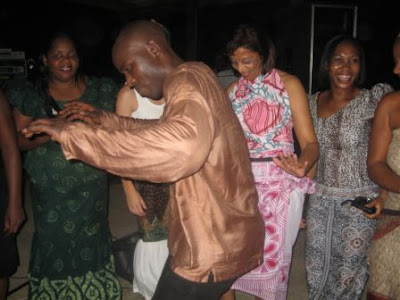I am sitting at the Café de Rome watching a man meticulously put together a plastic christmas tree. He takes each synthetic branch, unwrapping it like a bunch of spring onions, pealing back each individual branch, like pulling fingers taught. He bends the metal end into an L shape and then pokes it into the pole disguised as a very skinny, very straight tree trunk. He started from the bottom with the longest ones and then worked from the top down. Now he’s on a stepladder arranging and rearranging branches. He steps back every now and again, looks up at the tree to make sure the shape is right, no bulges or gaps where they shouldn’t be.
The man next to me asks, La fete c’est bien passé? And the waiter replies, Alhamdoulilahi. They are talking about a different fete. The feast of the sheep, or tabaski, or Eid al Hadj, was last week and people here are in recovery perhaps similar to the post Christmas slump where you realise you’ve spent all your money on perishables.
 The little kid at the next table points to the fake snow that drips its polystyrene down the walls. There are also white blobs stuck to the ceiling, outlined with white spray paint and covered in cotton wool. The man creating the christmas tree smiles and says, It’s too hot in here, isn’t it? The kid and his mum point out that the tree is tipping forward.
The little kid at the next table points to the fake snow that drips its polystyrene down the walls. There are also white blobs stuck to the ceiling, outlined with white spray paint and covered in cotton wool. The man creating the christmas tree smiles and says, It’s too hot in here, isn’t it? The kid and his mum point out that the tree is tipping forward.They are showing real christmas trees on TV and cars with snow caked on the roofs in some Western European country.
The Senegalese men next to me are talking about the financial crisis in Wolof, dropping in English and French with the ease of the well educated. They are talking excitedly and I really want to know what they are discussing, but unfortunately the French and English parts are only incidental. It seems all the interesting stuff tumbles out in Wolof.
Pictures of american car manufacturers and huge republican politicians talking into tiny microphones pass on the TV screen.
Ok so this is a different Dakar, or a particular priviledged Dakar. The Café de Rome is around the corner from my flat and I’ve been meaning to come here for a while. It is incredibly posh. There is actually customer service. You can sit down and people will come to you and ask you what you want. It also appears that over half of the things on the menu are actually available. The toilets are the nicest I’ve been to in a long while and as I turn to look at my bum on the way out I note that the mirror even makes you look thin. Sometimes you just need a little overpriced cappuccino, a fake christmas tree and a flat screen TV.
The three old men chatting away next to me look like old journalists, hair white-speckled, dark-rimmed glasses and distinguished. After smiling a lot in their direction I finally get up the courage to ask what they are discussing. The oldest one – the one with a full head of white hair – says, A little of everything. I ask them what they think about bailing out the American car industry and they say it’s a good idea if there are so many people relying on it for their livelihoods. But what about capitalism? I say. What about letting the free market do it’s business? I say. They shrug and smile. Why are we socialising our losses? I say. How this can help in the long term?
They are wiser than me. Or maybe shrugging and smiling makes them look wiser than me. I should practice that.
I ask if they are capitalists. They say, No! and shrink back as if I have asked them if they are mentally ill. And you, madame, what are you? one asks.
“Agnostic,” I say. They burst into laughter, they like that.
“Well then we are muslims,” he says with a wink in his voice.
“It’s funny. When you came to help African countries, you told us we must privatise everything and we did because we had no choice. But now…”
It’s true. I shrug and smile.






